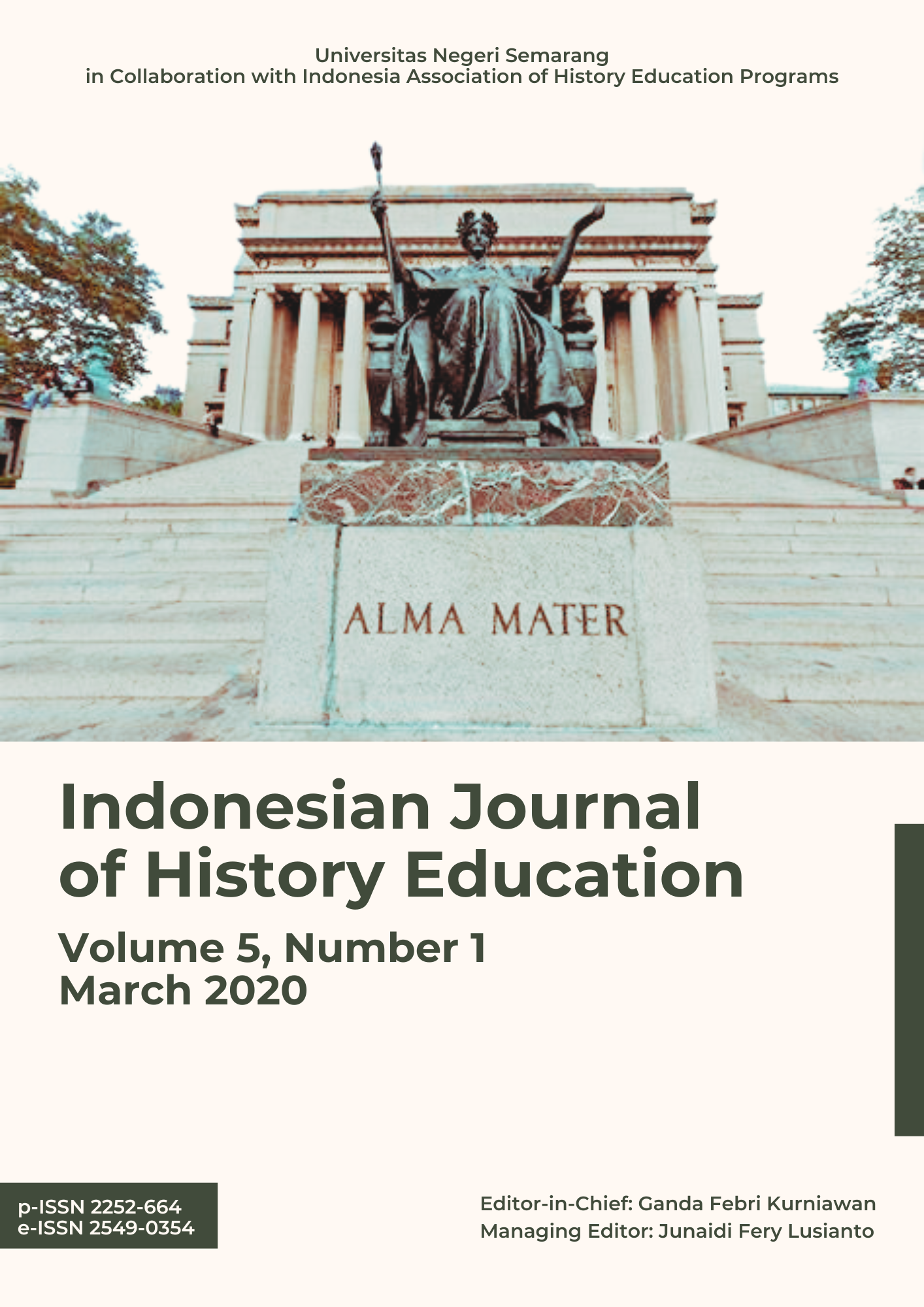Contribution of Conflict Materials in the Subject of Local History of the Demak Kingdom For Historical Awareness of Grade XI IIS 2 Students of Sultan Agung 2 Islamic High School Jepara
Abstract
This research aims to (1) know and analyze the effect of conflict material history learning in the study of local history of Demak Kingdom student awareness toward history and (2) students’ appreciation toward the material. The research method used is qualitative type research with a descriptive strategy. The source of data comes from informants, learning activities, and documents. Data collection techniques include observation techniques, interviews, and documentation. The result of this study was summarized into two major points that showed that (1) history learning using local sub-materials of local history contributed toward history awareness level. By studying conflicts that had happened in Demak Kingdom, students could prevent them from happening again in the future, and (2) student appreciation toward the material that related to their environment was positive.
References
Anggito, A., & Setiawan, J. (2018). Metodologi penelitian kualitatif. CV Jejak (Jejak Publisher).
Astawa, I. B. M. (2015). Memahami kewajiban guru dalam menyusun rencana pelaksanaan pembelajaran (RPP). Media Komunikasi Geografi, 16(1).
Budiani, S., Sudarmin, S., & Syamwil, R. (2017). Evaluasi Implementasi Kurikulum 2013 di Sekolah Pelaksana Mandiri. Innovative Journal of Curriculum and Educational Technology, 6(1), 45-57.
Devianty, R. (2017). Peran bahasa Indonesia dan bahasa Daerah dalam pendidikan karakter. Ijtimaiyah: Jurnal Pendidikan Dan Ilmu Sosial, 1(2), 79-101.
Hasan, S. H. (2003). Problematika pendidikan sejarah. Bandung: FPIPS UPI.
Leo Agung, S. (2014). Pengembangan Model KKBB Sebagai Upaya Peningkatan Kualitas Pembelajaran Sejarah SMA Di Solo Raya.
Margareth, M. Poloma. (2004). Sosiologi Kontemporer. Jakarta: PT. Raja Grafindo Persada.
Mariana, I. (2018). Pengantar Perencanaan pembelajaran di sekolah dasar.
Miles, Mattew B & A. Michael Huberman. (1992). Analisis Data Kualitatif. Jakarta: Universitas Indonesia Press.
Moleong, L. J. (2019). Metodologi penelitian kualitatif. PT Remaja Rosdakarya Bandung.
Puspita, W. (2018). Manajemen konflik: Suatu pendekatan psikologi, komunikasi, dan pendidikan. Deepublish.
Putra, O. M. (2018). POLA PIKIR TOKOH DAN NILAI PENDIDIKAN KARAKTER NOVEL LASKAR PELANGI KARYA ANDREA HIRATA SEBAGAI BAHAN AJAR SASTRA DI SMA (Doctoral dissertation, FAKULTAS KEGURUAN DAN ILMU PENDIDIKAN).
Rulianto, R. (2018). Pendidikan Sejarah Sebagai Penguat Pendidikan Karakter. Jurnal Ilmiah Ilmu Sosial, 4(2), 127-134.
Saidillah, A. (2018). Kesulitan Peserta Didik Dalam Proses Pembelajaran Sejarah. Jurnal Pendidikan Sejarah Indonesia, 1(2), 214-235.
Salkind, N. J. (2019). Teori-Teori Perkembangan Manusia: Sejarah Kemunculan, Konsepsi Dasar, dan Contoh Aplikasi. Nusamedia.
Sitepu, A. S. M. B. (2019). Pengembangan kreativitas siswa. Guepedia.
Sofyan, Y. M. (2010). Kekuasaan jawa: studi komparatif sistem kekuasaan kerajaan majapahit dan demak.
Sri, W., & Leo, A. (2013). Perencanaan Pembelajaran Sejarah. Yogyakarta: Ombak Dua.
Subagyo. (2003). Membangun Kesadaran Sejarah Semarang: Widya Karya.
Suardi, M. (2018). Belajar & pembelajaran. Deepublish.
Sugiyono, D. (2014). Metode penelitian pendidikan.
Suhendra, A. (2019). Implementasi kurikulum 2013 dalam pembelajaran sd/mi. Prenada Media.
Syafi'i, I. (2016). HAKEKAT KURIKULUM PENDIDIKAN DAN SEJARAH PERKEMBANGANNYA DI INDONESIA. Kariman: Jurnal Pendidikan Keislaman, 4(1), 1-18.
Wahidmurni, W. (2017). Pemaparan metode penelitian kualitatif.
Yaumi, M. (2018). Media dan teknologi pembelajaran. Prenada Media.
Copyright (c) 2020 Indonesian Journal of History Education

This work is licensed under a Creative Commons Attribution 4.0 International License.
Copyright Notice
An author who publishes in the Jurnal Indonesian Journal of History Education agrees to the following terms:
- Author retains the copyright and grants the journal the right of first publication of the work simultaneously licensed under the Creative Commons Attribution-ShareAlike 4.0 License that allows others to share the work with an acknowledgement of the work's authorship and initial publication in this journal
- Author is able to enter into separate, additional contractual arrangements for the non-exclusive distribution of the journal's published version of the work (e.g., post it to an institutional repository or publish it in a book) with the acknowledgement of its initial publication in this journal.
- Author is permitted and encouraged to post his/her work online (e.g., in institutional repositories or on their website) prior to and during the submission process, as it can lead to productive exchanges, as well as earlier and greater citation of the published work (See The Effect of Open Access).
Read more about the Creative Commons Attribution-ShareAlike 4.0 Licence here: https://creativecommons.org/licenses/by-sa/4.0/.




